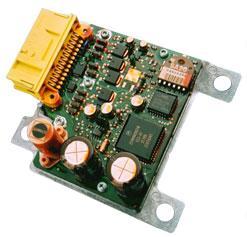Event Data Recorders
Posted: Fri Jul 30, 2010 10:36 am
Event Data Recorders

Cut-away:

Located under driver seat in Astro/Safari.

What is an EDR?
Event Data Recorders (EDRs) are functions within one or more vehicle electronic modules that capture vehicle and restraint information in the event of a crash in which air bags may or may not deploy. In General Motors vehicles, the EDR function is typically housed in a control module, such as the sensing and diagnostic module, the engine control module or the stability control or 4-wheel steering modules. These modules are located in various places in the vehicle, such as under a front seat, in the center console or under the dash.
What vehicles have EDRs?
Since 1973, when GM first introduced air bag equipped cars, some crash data has been recorded. Almost all vehicles sold in North America since 1997 are recording vehicle crash data. By 2005, General Motors, Ford, Isuzu, Mazda, Mitsubishi, Subaru, and Suzuki were all voluntarily equipping all of their vehicles with EDRs, according to NHTSA.
What data do EDRs record?
The amount of recorded data has expanded with time and technology. As of model year 2013, all EDRs are mandated to record:

Who owns the data and who has access?
EDRs and the data they store belong to vehicle owners. Police, insurers, researchers, automakers, and others may gain access to the data with owner consent. Without consent, access may be obtained through a court order. For example, in a Florida criminal case involving a vehicular manslaughter charge, the police obtained a warrant to access the EDR data. Courts have generally accepted this usage of the data.
For crashes that don't involve litigation, especially when police or insurers are interested in assessing fault, insurers may be able to access the EDRs in their policyholders' vehicles based on provisions in the insurance contract requiring policyholders to cooperate with the insurer. However, some states prohibit insurance contracts from requiring policyholders to consent to access.
Privacy advocates are raising warnings about how information from the boxes is being used, reliability of the devices and the extent to which they are tamper-proof.
Those of you with OnStar may already know that certain driving maneuvres will prompt a helpful voice from your speaker system, asking you if everything is alright.

Cut-away:

Located under driver seat in Astro/Safari.

What is an EDR?
Event Data Recorders (EDRs) are functions within one or more vehicle electronic modules that capture vehicle and restraint information in the event of a crash in which air bags may or may not deploy. In General Motors vehicles, the EDR function is typically housed in a control module, such as the sensing and diagnostic module, the engine control module or the stability control or 4-wheel steering modules. These modules are located in various places in the vehicle, such as under a front seat, in the center console or under the dash.
What vehicles have EDRs?
Since 1973, when GM first introduced air bag equipped cars, some crash data has been recorded. Almost all vehicles sold in North America since 1997 are recording vehicle crash data. By 2005, General Motors, Ford, Isuzu, Mazda, Mitsubishi, Subaru, and Suzuki were all voluntarily equipping all of their vehicles with EDRs, according to NHTSA.
What data do EDRs record?
The amount of recorded data has expanded with time and technology. As of model year 2013, all EDRs are mandated to record:
- Change in forward crash speed
- Maximum change in forward crash speed
- Time from beginning of crash at which the maximum change in forward crash speed occurs
- Speed vehicle was traveling
- Percentage of engine throttle, percentage full (how far the accelerator pedal was pressed)
- Whether or not brake was applied
- Ignition cycle (number of power cycles applied to the EDR) at the time of the crash
- Ignition cycle (number of power cycles applied to the EDR) when the EDR data were downloaded
- Whether or not driver was using safety belt
- Whether or not frontal airbag warning lamp was on
- Driver frontal airbag deployment: time to deploy for a single stage airbag, or time to first stage deployment for a multistage airbag
- Right front passenger frontal airbag deployment: time to deploy for a single stage airbag, or time to first stage deployment for a multistage airbag
- Number of crash events
- Time between first two crash events, if applicable
- Whether or not EDR completed recording

Who owns the data and who has access?
EDRs and the data they store belong to vehicle owners. Police, insurers, researchers, automakers, and others may gain access to the data with owner consent. Without consent, access may be obtained through a court order. For example, in a Florida criminal case involving a vehicular manslaughter charge, the police obtained a warrant to access the EDR data. Courts have generally accepted this usage of the data.
For crashes that don't involve litigation, especially when police or insurers are interested in assessing fault, insurers may be able to access the EDRs in their policyholders' vehicles based on provisions in the insurance contract requiring policyholders to cooperate with the insurer. However, some states prohibit insurance contracts from requiring policyholders to consent to access.
Privacy advocates are raising warnings about how information from the boxes is being used, reliability of the devices and the extent to which they are tamper-proof.
Those of you with OnStar may already know that certain driving maneuvres will prompt a helpful voice from your speaker system, asking you if everything is alright.
- GM Supports Event Data Recorder (EDR) Mandate to Improve Vehicle Safety
- GM corporate EDR info
- Vehicles with an EDR on board. (Current as of June 16, 2010.)
- Harris Technical Services - Traffic Accident Reconstruction
(loads of information such as articles, papers, legislation and case law both for and against EDR/CDR's)